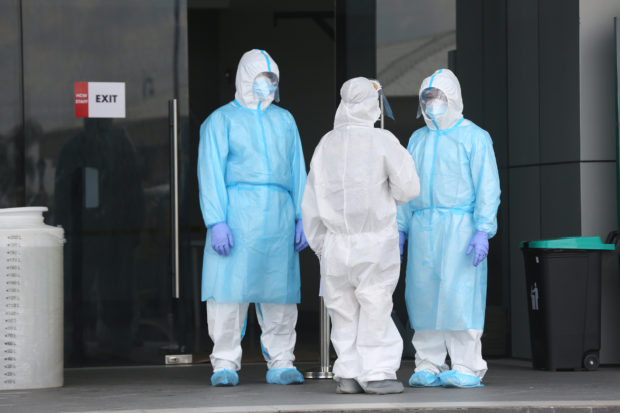BIR guidelines out on tax breaks to be enjoyed by health frontliners
MANILA, Philippines — The special allowances and hazard pay of health and medical professionals in the fight against COVID-19 will not be taxed as long as the country is under a state of national emergency.
The Bureau of Internal Revenue (BIR) on Saturday published Revenue Regulations No. 29-2020, which serves as the guidelines on the income tax exemption provisions of Republic Act No. 11494, or the Bayanihan to Recover as One law, or Bayanihan 2.

DUE FOR TAX EXEMPTIONS Health workers at a quarantine in the Philippine Arena Complex, three months into the lockdown on Luzon island. By then, President Duterte had ordered the release of P32 million in compensation to families of front-liners who died of COVID-19. —NIÑO JESUS ORBETA
Compensation
Bayanihan 2 exempts from tax the hazard duty pay of temporarily hired health workers as well as the COVID-19 special risk allowance for both public and private health workers.
RR 29-2020 also noted the monthly special risk allowance being extended to health workers who were in contact with COVID-19 patients during the state of national emergency.
President Duterte extended last month the state of national emergency by one more year, or up to Sept. 12, 2021. He first declared the emergency in March at the onset of the pandemic.
Besides the special allowance and hazard pay, also exempt from taxes is the compensation for health workers who were infected by the coronavirus while performing their duty or who died “while fighting COVID-19,” the BIR said.
The exemption covers P1 million for those who died of COVID-19; P100,000 for those who got critically ill; and P15,000 for those with mild or moderate infections.
The tax-free compensation covered amounts granted from Feb. 1 and during the state of national emergency, as long as these amounts were paid within three months after confinement or death.
Retirement benefits
In the case of death, the compensation will be also excluded from the gross estate of the deceased that will later be subjected to estate tax, the BIR said.
Also exempt from taxes are the retirement benefits of both officials and employees of any private company received between June 5 and Dec. 31 this year.
The tax exemption will be granted “provided that the amount received is in accordance with a retirement plan duly registered with the BIR,” according to RR 29-2020.
However, reemployment within the next 12-month period will be considered nonretirement, the BIR said.
“If the reemployment happens within calendar year 2020, the employer shall include the said retirement benefits in the gross income of the concerned official or employee for 2020. However, if the reemployment will occur in 2021 and within the 12-month period, the concerned employee shall pay the taxes due on the retirement benefits received within 30 days from date of reemployment, or on the due date for the payment of the second installment payment of 2020 income tax, whichever comes later, without penalties,” the BIR explained.
Retroactive
Tax exemptions for health workers and retirees will be retroactive, such that they must receive a refund from their employers for deductions made before Bayanihan 2 took effect.
“Concerned employers of the public or private health workers and human resources for health [temporary workers] shall likewise refund the income tax withheld from the said income payments after the year-end adjustment by the employer for purposes of determining the taxable compensation and the corresponding tax due of the employees. The said adjustment will determine which employee has been withheld with more or less than the tax due. If the adjustment resulted in excess tax remittance, such excess shall be deducted or applied as deduction in the succeeding withholding tax remittance,” the BIR said.
COVID-19-related items
Another set of guidelines issued on Saturday, under a separate RR 28-2020, grants tax perks to the manufacture and importation of essential goods and equipment in pandemic response.
The BIR said COVID-19-related items imported between June 25 and Dec. 19 are exempt from the value-added tax and excise tax, among other fees.
Among the tax-exempt products are personal protective equipment; laboratory, medical and surgical devices, equipment and supplies; medicines and vitamins; testing kits; cleaning and sanitation materials, and other goods that may be included by the health and trade departments.
Also covered are waste management equipment, as well as raw materials for the local manufacture of essential COVID-19 mitigation items.
For more news about the novel coronavirus click here.
What you need to know about Coronavirus.
For more information on COVID-19, call the DOH Hotline: (02) 86517800 local 1149/1150.
The Inquirer Foundation supports our healthcare frontliners and is still accepting cash donations to be deposited at Banco de Oro (BDO) current account #007960018860 or donate through PayMaya using this link.
